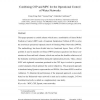Free Online Productivity Tools
i2Speak
i2Symbol
i2OCR
iTex2Img
iWeb2Print
iWeb2Shot
i2Type
iPdf2Split
iPdf2Merge
i2Bopomofo
i2Arabic
i2Style
i2Image
i2PDF
iLatex2Rtf
Sci2ools
107
click to vote
EAAI
2016
2016
Combining CSP and MPC for the operational control of water networks
This paper presents a control scheme which uses a combination of linear Model Predictive Control (MPC) and a Constraint Satisfaction Problem (CSP) to solve the non-linear operational optimal control of Drinking Water Networks (DWNs). The methodology has been divided into two functional layers: First, a CSP algorithm is used to transfer non-linear DWNs pressure equations into linear constraints on flows and tank volumes, which can enclose the feasible solution set of the hydraulic non-linear problem during the optimization process. Then, a linear MPC with tightened constraints produced in the CSP layer is solved to generate control strategies which optimize the control objectives. The proposed approach is simulated using Epanet to represent the real DWNs. Non-linear MPC is used for validation. To illustrate the performance of the proposed approach, a case study based on the Richmond water network is used and a realistic example, D-Town benchmark network, is added as a supplementary ca...
| Added | 02 Apr 2016 |
| Updated | 02 Apr 2016 |
| Type | Journal |
| Year | 2016 |
| Where | EAAI |
| Authors | Cong Cong Sun, Vicenç Puig, Gabriela Cembraño |
Comments (0)

